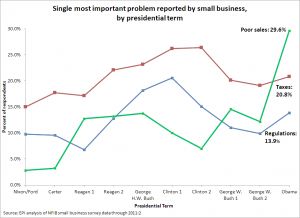Regulatory Uncertainty Not Causing Unemployment

Some prominent politicians and commentators have argued that uncertainty about the future regulations applying to businesses is causing joblessness. The argument is that many employers are holding back on new projects or hiring new employees because they’re unsure about the long-term regulatory picture. Conservatives are the primary source of this argument, but liberals also accuse conservatives of increasing uncertainty by trying to roll back regulation. Either way, the argument is deeply flawed. The economic impact of regulatory uncertainty seems to be slight, if it exists at all.
There’s nothing wrong with the logic behind the argument. If future regulatory changes would make a big difference to a business, it could make sense for the business to hold off on long-term commitments. This logic is behind claims that "Obama's regulatory flood is drowning economic growth." But the question is whether this kind of uncertainty is great enough to make a real difference to the economy. We also need to keep in mind that regulatory uncertainty could actually stimulate investment. If businesses were worried that future regulatory burdens were coming down the pike, they'd want to increase investments today in order to benefit from the current more lenient regulations -- a point ably made by Greg Burliss.
To begin with, the pattern of unemployment doesn’t fit the regulatory uncertainty theory. As Think Progress has pointed out, unemployment is currently lowest in health care, extractive industries, and the financial sector -- exactly the areas where there is the most on-going regulatory effort. This is exactly the opposite of the pattern you would expect to find. The uncertainty in these industries should be higher than in the rest of the economy, since the regulations are still being launched. These are also the very regulatory schemes that Republicans are most dedicated to undoing, further increasing the uncertainty. So why aren’t these the sectors in the worst economic positions?
One problem with the regulatory uncertainty argument is that businesses don’t seem particularly concerned about the issue. A survey of business owners failed to reveal evidence of anxiety about the regulatory climate. Businesses expressed little concern about regulations in general in discussing their financial situations. Another survey showed that small businesses do worry about regulation – but they were even more worried about regulation when George H.W. Bush was president. Consider this chart.
As you can see, the current recession has been connected with a big increase of anxiety about poor sales, not with worries about regulation. There have been a host of other surveys, and they all come to the same conclusion.
History also raises questions about the claim. It is not, in fact, true that regulatory uncertainty is "the highest it has been since the New Deal." Between 1970 and 1981, Congress passed the federal air and water pollution laws, OSHA, RCRA, the Endangered Species Act, and the Superfund law. No one knew just how these laws would be implemented. That's at least as much uncertainty as businesses face today. There don’t seem to be any correlations between these regulatory issues and the state of the economy, which had a lot more to do with oil prices and interest rates. We can also learn something from the extremely close 2000 election. Until the Supreme Court ruled in December of 2000, there was no way of being sure whether we’d have liberal or conservative in the White House. If regulatory uncertainty (or fear of future regulation) was a major economic force, GDP should have gone down in the fourth quarter of 2000 when the outcome of the election was too close to call, then up in the first quarter of 2001 when Bush took office. The opposite happened. The economy went up at an annual rate of 2.4% during the election but shrank at a 1% rate after Bush took office. If uncertainty about who would win the presidential election had any effect, it was dwarfed by other factors. Yet the difference between Bush and Gore had huge implications for the country’s economic and regulatory trajectory.
Finally, the international evidence does not support the argument. Western European countries have neither a Barack Obama nor Tea Party movement to cause uncertainty about future regulation or deregulation. For instance, in Britain, the political parties agree on the need to reduce carbon emissions in order to address climate change. If regulatory uncertainty is a big part of America’s economic problem, these countries should be doing better than we are in recovering from the recession. That doesn’t seem to be true. In January 2012, unemployment in Britain was about the same as unemployment in the U.S., but their unemployment was going up while ours was going down.
It’s not surprising that regulatory uncertainty seems to have such marginal economic effects. Regulations do impose burdens on businesses, but the numbers are relatively small compared to everything else that affects a business, from wages to sales trends. You wouldn’t expect uncertainty about a secondary factory like regulation to have significant economic impact. The Obama Administration’s regulatory efforts may be good or bad, and the same can be said about Republican efforts to roll them back. But either way, the impact of the resulting uncertainty on the economy is simply not a big deal.




